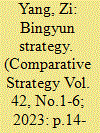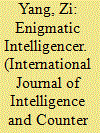| Srl | Item |
| 1 |
ID:
193515


|
|
|
|
|
| Summary/Abstract |
This article explores the evolution and application of the Chinese Communist Party’s (CCP) bingyun strategy pre-1949. Developed by Chinese and Soviet thinkers, bingyun or “Soldier Movement” aimed to subvert opposing armed forces to either bring them under CCP command or cause them to self-destruct. The bingyun strategy was practiced throughout the revolutionary period with lasting legacy in present-day China. By examining cases from the First Kuomintang-CCP United Front, First Phase of the Chinese Civil War, Sino-Japanese War and the Second Phase of the Chinese Civil War, this article demonstrates how bingyun adapted to changing circumstances and its far-reaching consequences for CCP military success that realized its takeover of China in 1949.
|
|
|
|
|
|
|
|
|
|
|
|
|
|
|
|
| 2 |
ID:
191886


|
|
|
|
|
| Summary/Abstract |
This research investigates the life of Chinese communist secret police chief Deng Fa and his pioneering influence on the profession of political policing. The Chinese secret police handle intelligence and counterintelligence duties in addition to suppressing political dissent. During the revolutionary period, the secret police’s neutralization of hidden threats proved critical to the Chinese Communist Party’s rise to power. The present-day secret police still stand guard for the party-state while closely observing its revolutionary traditions. Through examining Deng Fa and his professional legacy, this article hopes to contribute to the academic discourse on China studies and intelligence studies.
|
|
|
|
|
|
|
|
|
|
|
|
|
|
|
|
| 3 |
ID:
183462


|
|
|
|
|
| Summary/Abstract |
Following their victory in the Chinese Civil War, the Chinese Communists initiated a nationwide counterinsurgency. In Guangxi, a mountainous province at the China-Vietnam border, anti-communist rebels waged an insurgency from 1949 to 1952, hoping that foreign support and Cold War rivalries could eventually restore the ancien régime. This research investigates the counterinsurgency in Guangxi, one of the more mutinous provinces in post-Civil War China. By situating the Guangxi counterinsurgency in the global context, this article aims to contribute to the discussion of Chinese counterinsurgency strategy, experience and how the People’s Republic’s triumphed over the armed resistance.
|
|
|
|
|
|
|
|
|
|
|
|
|
|
|
|